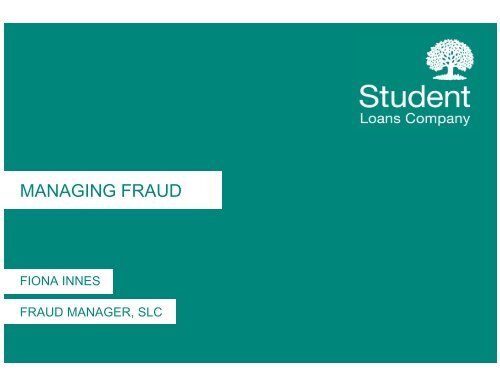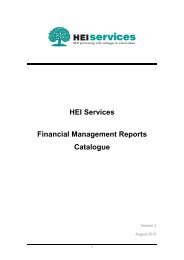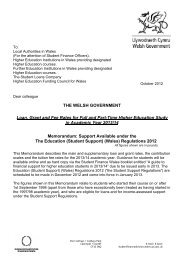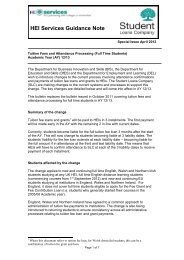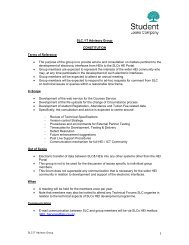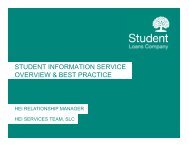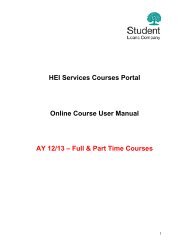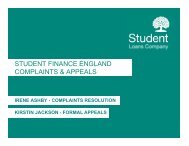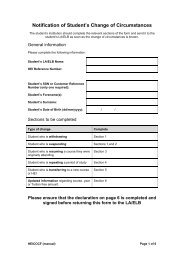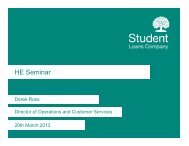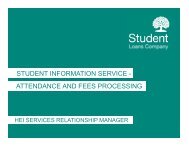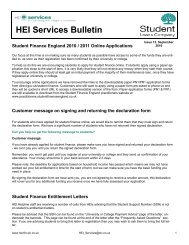MANAGING FRAUD - HEI Services
MANAGING FRAUD - HEI Services
MANAGING FRAUD - HEI Services
You also want an ePaper? Increase the reach of your titles
YUMPU automatically turns print PDFs into web optimized ePapers that Google loves.
<strong>MANAGING</strong> <strong>FRAUD</strong><br />
FIONA INNES<br />
<strong>FRAUD</strong> MANAGER, SLC
Special Investigations Unit – (SIU)<br />
Introduction<br />
The Special Investigations unit consists of two teams, SIU and SIU2. Both are involved in<br />
investigating suspected customer fraud relating to all parts of the application process from personal<br />
information stated on the paper p form or online, to Childcare and Disabled Student Allowance claims.<br />
The teams also deal with any residency issues which may be highlighted.<br />
Size of the Team<br />
The SIU has 8 permanent members of staff and one Manager. The Manager is also responsible for<br />
SIU2 and this team also has 8 members of staff and one Team Leader.<br />
Heather Laing, the Fraud Prevention & Detection Manager ,has overall responsibility for both Teams<br />
and reports into the Company Secretary Chris Andrew.<br />
Where are we<br />
The teams are located within the Bothwell Street office in Glasgow – Contact details provided.
What do we do<br />
• The teams are responsible for monitoring the<br />
levels of fraud within the system and identifying<br />
ways in which these levels can be kept to a<br />
minimum.<br />
• As part of the work undertaken the team use a<br />
number of fraud prevention tools, reports and<br />
pattern and trend analysis techniques to ensure<br />
that we monitor the system and remove found<br />
fraud.<br />
• We also consult most areas of the Business<br />
daily to discuss potential fraud cases and ways<br />
in which fraud can be reduced.<br />
• We are consulted as part of all new projects<br />
which involve the application process and<br />
potential fraud concerns are raised and are<br />
taken into consideration when planning any new<br />
implementations.
Fraud Prevention Tool – SIRA -<br />
(Syndicated Intelligence for Risk Avoidance)<br />
• SIRA is a fraud management system provided by Synectic Solutions. The system helps the SIU track<br />
fraudulent applications within the Student Finance system by using a rules based search engine to<br />
identify duplicate information such as Bank details, email addresses and Phone numbers.<br />
• Rules have been applied to the database and all approved applications for Student Finance are run<br />
against the Rules to determine if matches are present. Any matches are presented to the team in<br />
batches depending on the Rules hit by the application. Examples of the worklists completed by the<br />
team are, Matches to Fraud, Matches to Suspect, and Multiple Matches. The lists are prioritised and<br />
worked accordingly.<br />
• The system matches current year application data and enables the team to add suspect information<br />
such as names and addresses of individuals who may apply for funding and who are not entitled to<br />
receive it.<br />
• Students applying for funding, and who have been approved, will appear on SIRA within 24 hours if<br />
they match for any reason with other current students, or fraudulent students from previous academic<br />
years.<br />
The SIRA check is carried out after all other SLC checks are undertaken. These are listed on the<br />
next page.
What checks are carried out as part of the Application<br />
Process<br />
SLC have a number of checks in place that help prevent fraud.<br />
• Our primary method of identity verification is through the Identity and Passport<br />
Service (IPS) link that uses the applicant’s passport number to verify the identity<br />
details they have submitted.<br />
•The applicant’s National Insurance Number (NINO) is also matched against DWP<br />
records.<br />
•The Verification of Household Income (VHI) checking service allows the income of the<br />
students sponsor/s to be validated via HMRC.<br />
• Once the application has been processed, the University’s s attendance confirmation<br />
provides us with a further check to ensure that the individual is in attendance before<br />
the instalments are paid.<br />
The SIU receive any exception cases highlighted as part of the above checks.
SIU2<br />
•What do we do<br />
• In order that we could understand the value of funds that could be saved through enhancing<br />
our fraud prevention and detection capability, SLC invested in membership of CIFAS and<br />
National SIRA and a team of staff (SIU 2) to work the suspect fraud cases identified as a result<br />
of this proactive work.<br />
• The SIU2 has been in post for almost 18 months and has been a positive addition to the Fraud<br />
Prevention work already undertaken by the Company by highlighting a number of high risk areas<br />
and these are listed later in this presentation.
What’s National SIRA & CIFAS<br />
National SIRA – (Syndicated Intelligence for Risk Avoidance)<br />
National SIRA is an enhanced version of SIRA which is worked by the original SIU. National SIRA allows us to match<br />
with all other external users of the service which widens our scope for preventing fraud as checking multiple<br />
applications shows any inconsistencies with information being provided by individuals across a number of other<br />
applications for finance. The system is Rules based which means each application is checked against a set of<br />
questions and any positive matches are shown in batch format for staff to review. Examples of matches are, multiple<br />
use of same, address, bank details, email addresses or telephone numbers.<br />
CIFAS – (Credit Industry Fraud Avoidance Service)<br />
As well as having access to the National SIRA data we are also linked into CIFAS. CIFAS is an organisation which<br />
collates all fraud data from organisations such as Banks, Building Society’s, Insurance Company’s plus many other<br />
financiali institutes. t The referrals from CIFAS will take priority it asthey include actual fraud cases, this means any<br />
matches we have with this data will be due to the students having committed fraud against another organisation.<br />
SLC were the first sizeable public sector organization to become members of CIFAS in September 2011.<br />
Top 5 Referral Reasons<br />
•The address has been used in connection with a fraud.<br />
•The identity details have been used in connection with a fraud.<br />
•The applicant and/or sponsor has provided false income details when applying for some form of credit (mortgages<br />
and/or other loans).<br />
•The bank details have been used in connection with a previous fraud.<br />
•The telephone number and/or e-mail address have been used in connection with a previous fraud.
What kind of fraud do we see in SLC<br />
• Eligibility<br />
Identity fraud facilitated by false identity and residence documents.<br />
Non attendance<br />
• Entitlement<br />
Sponsor claiming to be a lone parent when they are one of a couple;<br />
Childcare grant fraud;<br />
DSA grant fraud;<br />
Sponsor’s income fraud;<br />
• Diversion of payment facilitated by e.g. Phishing, smishing or vishing.
Case Studies<br />
•Two examples have been given of the type of cases the team deal with, one relates to a mature<br />
student and the other a student supported by a sponsor. Example one demonstrates how the<br />
information from CIFAS can provide us with details about aliases used by students to apply for<br />
different sources of funding. This can then be used to establish the true circumstances of the<br />
application.<br />
•Examplep<br />
1 relates to a mature student who submitted a late application on 17th October for a course<br />
that started 19th September 2011.<br />
•This account has 13 CIFAS matches that relate to adverse credit and the use of aliases for the<br />
purpose p of obtaining credit. The investigation established that the student has used various names<br />
and addresses and that she had previous undeclared study from 2004 using one of the aliases that<br />
was flagged by the CIFAS match. When questioned about a) marital status b) previous study and c)<br />
using different names and addresses, the student provided false information to prove their<br />
circumstances.<br />
•Outcome –Current funding has been stopped, the details have been recorded on CIFAS, which could<br />
impact on her future credit rating and she has been deemed unfit to receive any further student<br />
funding.
Case Studies Continued<br />
•Example two - A student has applied with a single sponsor, when indications are that<br />
the sponsor has a partner and has made applications in the wider financial services<br />
sector as one of a couple. Again, this gives us good reason to enquire into the true<br />
circumstances of the application.<br />
•Example 2 relates to a returning student under 25 who applied for funding on the basis<br />
that she was supported by a single sponsor, her mother.<br />
•This match was generated by National SIRA and relates to the household composition.<br />
Applications for credit have been made at the address shared by the student and her<br />
mother by an undeclared male, including a joint mortgage application. The investigation<br />
established that both the student and her mother had made a false statement during the<br />
application process.<br />
•Outcome – The application has been reassessed to nil entitlement and the student has<br />
been deemed unfit to receive any further funding.
Phishing<br />
What is phishing<br />
Phishing is the term given to a type of fraud which involves a third party emailing an individual pertaining to be<br />
from an organisation when in fact they are not. The individual, believing the email to be genuine, verifies a number<br />
of personal pieces of information which allows the third party to amend their online records and redirect money to<br />
another bank accounts. The SIU track and monitor student accounts if they have been victims of this type of<br />
incident, and are involved in the proactive measures put in place to combat further losses.<br />
What have SLC done to prevent these attacks<br />
• Enhanced our phishing site take down service.<br />
• Review and removal of excessive customer<br />
data held on online accounts.<br />
• Active account monitoring for previously<br />
affected and high risk accounts – together with<br />
use of IP address searches.<br />
• Customer text alerts introduced for students<br />
whose bank account details have been<br />
amended.<br />
• Duplicate bank details reports monitored daily.<br />
• Media outreach programme to warn students of the<br />
phishing threat<br />
• Outbound calling to students identified as being at risk<br />
of payment diversion<br />
• Use of existing fraud detection tools<br />
• Contacting ti universities iti directly if there are specific<br />
attacks against their students
Some Facts and Figures<br />
The figures below show the savings generated by both Units in the last 12<br />
months.<br />
Savings<br />
SIU £7,785,552.00<br />
SIU2 £2,594,815.00<br />
Analyst within SIU £3,199,540.00<br />
Total £13,579,907.00<br />
Th b fi l t t 2524 t d t h l titl d t St d t<br />
The above figures relate to 2524 students who are no longer entitled to Student<br />
Finance.
How does fraud happen<br />
• Fraud generally occurs as a result of<br />
a combination of factors.<br />
• For many years, this has been<br />
represented as the “Fraud triangle”<br />
(right).<br />
• Motivation – need or greed<br />
• Opportunity – weak controls, poor<br />
security, low likelihood of detection –<br />
some people are honest, some<br />
dishonest and some can be swayed.<br />
• Rationalisation – most people obey<br />
the law because they believe in it but<br />
can rationalise fraud “ as a<br />
victimless crime” or it’s just a fiddle,<br />
not really acrime.<br />
Motivation<br />
Rationalisation<br />
Opportunity
Summary of SLC’s anti fraud risk management approach<br />
Key priorities:<br />
Priority 1 – Build and apply knowledge and<br />
collaborate with others to prevent and detect<br />
fraud<br />
Priority 2 – Achieve economic efficiency by<br />
investing in SLC’s fraud prevention capability to<br />
reduce the amount of student funding lost to fraud<br />
Priority 3 – Develop an anti-fraud culture where<br />
countering fraud is the responsibility of all those<br />
involved in supporting and delivering the SFE<br />
service<br />
Priority 4 – Assess the risk of fraud and measure<br />
the level of fraud within student funding<br />
Pi Priority it 5 – Disrupt and punish fraudsters
What can you do<br />
Whatever Department you working in, you can do your part to reduce the impact of fraud. You may not realise the part you can play<br />
however do not underestimate your involvement in Fraud Prevention.<br />
All members of staff and colleagues, have a duty to report suspicions of fraud, both internal and external, and raise concerns where<br />
areas of weakness in procedures are identified.<br />
<strong>HEI</strong>’s can get involved by reporting any irregularities you become aware of, particularly in relation to:<br />
– Attendance; and<br />
– Status<br />
If staff have concerns with an application, or documentary evidence submitted as part of that application, details of the case should<br />
be passed to the Special Investigations Unit by either emailing siu@slc.co.uk or calling us on 0141 243 3336.<br />
If you receive a call from a student who has not received their expected funding on the payment date due, and the bank details have<br />
been amended without the students consent ,calls should be put through to the phishing hotline on 0141 243 3583.<br />
If a student has received an email asking them to verify their personal information be clicking on a link contained within the email<br />
this should be passed to phishing@slc.co.uk
QUESTIONS


